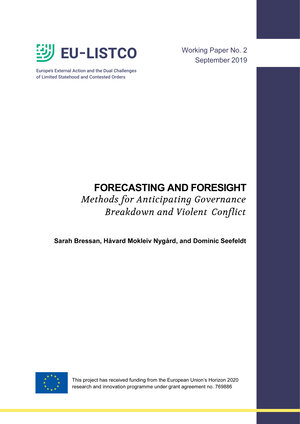
In this paper, authors Sarah Bressan, Håvard Mokleiv Nygård, and Dominic Seefeldt present the evolution and state of the art of both quantitative forecasting and scenario-based foresight methods that can be applied to help prevent governance breakdown and violent conflict in Europe’s neighbourhood. In the quantitative section, they describe the different phases of conflict forecasting in political science and outline which methodological gaps EU-LISTCO’s quantitative sub-national prediction tool will address to forecast tipping points for violent conflict and governance breakdown. The qualitative section explains EU-LISTCO’s scenario-based foresight methodology for identifying potential tipping points. After comparing both approaches, the authors discuss opportunities for methodological advancements across the boundaries of quantitative forecasting and scenario-based foresight, as well as how they can inform the design of strategic policy options.